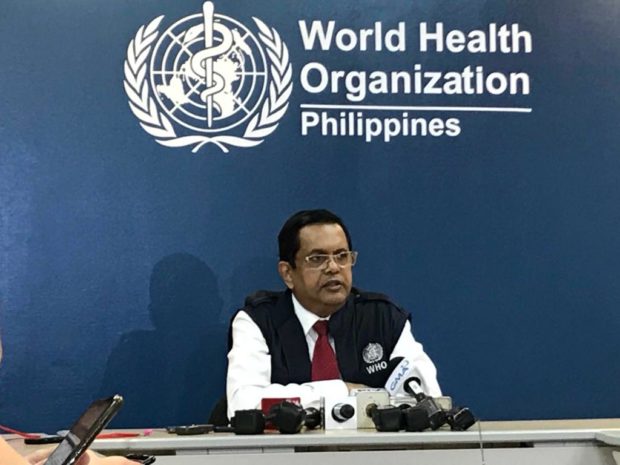
Dr. Rabindra Abeyasinghe, WHO representative to the Philippines. INQUIRER.net file photo / Cathrine Gonzales
MANILA, Philippines — An official of the World Health Organization (WHO) on Tuesday cautioned the Department of Health (DOH) in its COVID-19 messaging, warning of implications in classifying the Philippines as “low risk” for COVID-19.
“Classifying any country as low risk has implications. We are in a pandemic, the virus is everywhere… Are we at low risk of future COVID cases? No, we are not at low risk of future cases. This is a pandemic, we are dealing with a very delicate situation,” WHO representative to the Philippine Dr. Rabindra Abeyasinghe said in an interview on ABS-CBN News Channel.
“I think we need to be more cautious. It’s not costly to err on the side of caution. We need to be consistent in our messaging, the public needs to be aware that the risk remains, they need to follow the protocols, they need to follow the minimum public health standards,” he added.
The DOH earlier said the country is already at low-risk classification for COVID-19 case trend after recording a negative growth rate in cases and a lower average daily attack rate.
But the WHO official warned that giving the public the “wrong” message could lead to lower compliance in the minimum public health standards.
“So we have to be careful here,” added Abeyasinghe.
Further, he said that the number of vaccinations in the Philippines is “nowhere near” the rate needed to rule out any “major surges” in the future even as he recognized “significant progress” in the country’s inoculation, particularly in the National Capital Region.
“So we continue to urge, from WHO’s perspective, that we use the available vaccines, rationally, meaning we use the vaccines recognizing that we have limited supply to protect the most at risk, the most vulnerable so we potentially prevent the overwhelming of the hospitals if and when surge of delta variant or another variant happens,” he added.
Nevertheless, Abeyasinghe commended the country for implementing measures to prevent the Delta variant from being transmitted locally.
“We commend the Philippines for the measures they have implemented in holding the variant out. So far what we have confirmed among the limited sampling for genome sequencing is that we’ve only picked up the Delta variant at points of entry or [from] returning Filipinos,” he said.
“What is good is that, up to now, with the limited sampling, we have not been able to pick up evidence of Delta variant transmission in the communities. That is good because what we know about the transmissibility of the Delta variant is that it’s significantly more transmissible,” he added.
As of July 5, the Philippines has recorded a total of 19 Delta variant infections, including two new cases reported on Monday.